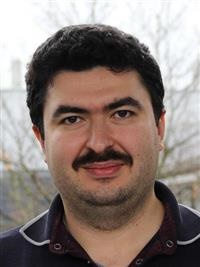Seminar on Supercapacitive bioelectrochemical cells for simultaneous generation and storage of electric power
Dr. Dmitrii Pankratov, Department of Chemistry, Technical University of Denmark
Info about event
Time
Location
Meeting room 1590-213, iNANO, Gustav Wieds Vej 14, 8000 Aarhus C

Supercapacitive bioelectrochemical cells for simultaneous generation and storage of electric power
Enzymatic fuel cells offer an alternative to conventional batteries or fuel cells due to their high catalytic activity and unique substrate specificity of the biocatalysts, as well as their ability to convert fuels and oxidants into non-toxic products with eco-friendly impacts. Utilizing the inherent electrode capacitance as an active charge-storing element in supercapacitive bioelectrochemical cells (SBCs) enables to enhance the efficiency of electron transfer processes proceeding in the system and further miniaturization and simplification of a full-function device by elimination of internal capacitors in the electronic circuit [1].
Different nanomaterials and nanocomposites have been explored as material supports for immobilization of enzymes in the energy converting part or as a charge-storing component of SBC to achieve an efficient synergistic integration of two functional elements within a singular contrivance [2]. Utilization of a redox polymers acting simultaneously as a charge-storing component and as a redox mediator for the enzymes embedded in the polymer matrix allows achievement of high specific power density coupled with low anodic and cathodic leakage currents [3].
The concept of the SBC has recently brought one-step further to the development of photo-bioelectrochemical cells (photo-biosupercapacitors), leading to a significant enhancement in the performances when an additional charge-storing component was integrated [4]. Utilization of the functionalized carbon nanotubes [5] or three-dimensional graphene surface [6] allows better attraction of thylakoid membranes to the electrode surface and, as consequence, higher photocurrent output and stability compared to the conventional approaches.
In this talk, latest advancements in the field of SBCs will be highlighted with an emphasis on the advantages, drawbacks and further perspectives of practical applications of this novel type of electric power biodevices.
References
[1] Pankratov D., Falkman P., Blum Z., Shleev S. Energy Environ. Sci., 2014, 7 (3), 989-993.
[2] Pankratov D., Blum Z., Shleev S. ChemElectroChem, 2014, 1 (11), 1798-1807.
[3] Pankratov D., Conzuelo F., Pinyou P., Alsaoub S., Schuhmann W., Shleev S. Angew. Chem., Int. Ed., 2016, 55, 15434–15438.
[4] Pankratova G., Pankratov D., Hasan K., Åkerlund H.-E., Albertsson P.-Å., Leech D., Shleev S., Gorton L., Adv. Energy Mater., 2017, 7 (12), 1602285.
[5] Pankratov D.; Pankratova G.; Dyachkova T.P.; Falkman P.; Åkerlund H.-E.; Toscano, M.D.; Chi, Q.; Gorton. L. ACS Energy Lett. 2017, 2, 2635–2639.
[6] Pankratova G., Pankratov D., Di Bari C., Goñi-Urtiaga A., Toscano M.D., Chi Q., Pita M., Gorton L., De Lacey A. L. ACS Appl. Energy Mater. Accepted manuscript.
Biography
Dr. Dmitrii Pankratov obtained his MS degree in Physical Chemistry from the Bryansk State University (Russia) in 2008. In 2011 he completed a PhD in Inorganic Chemistry under the supervision of Prof. I. Gorichev at the Moscow State Pedagogical University. The same year he joined the Prof. A. Yaropolov´s group at the A.N. Bach Institute of Biochemistry, Russian Academy of Sciences and worked on development of conductive biocomposite materials for microbiosensors and biofuel cells and on supercapacitors based on the composite materials of conductive polymers and carbon. In 2012 he was admitted as a PhD student of Malmö University in S. Shleev´s group, where he defended his PhD in Biomedical Science on the development of bioelectrochemical devices based on various redox enzymes in 2016.
Currently he is working on supercapacitive photo-bioelectrochemical cells and biobatteries with Assoc. Prof. Q. Chi in the Department of Chemistry at Technical University of Denmark under the H.C. Ørsted postdoc fellowship. His research interests include the development and electrochemical characterization of bioelectrodes based on redox enzymes and photosynthetic membranes or living cells with special emphasis on their potential application in hybrid systems for simultaneous generation and storage of electric power.
Host: Associate professor Elena Ferapontova, iNANO & Dept. of Chemistry, AU
